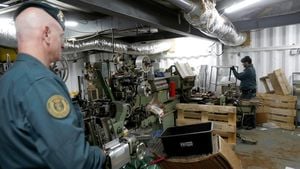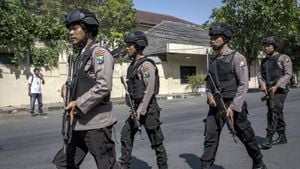Saudi Arabia's Vision 2030, aimed at diversifying the kingdom's economy beyond oil dependency, gained momentum recently with significant international discussions. The Minister of Economy and Planning, Khalid Al-Falih, met with international counterparts to bolster economic collaboration.
Al-Falih emphasized the importance of these partnerships, stating, "Our Vision 2030 aims at breaking away from oil dependency and enhancing our international economic partnerships," as reported by Al Jazeera. These efforts include attracting foreign investments, which will play a pivotal role in Saudi Arabia's economic transformation.
Recently, Khalid Abbas, the Chairman of the Administrative Capital for Urban Development, hosted Andreas Baum, the Swiss Ambassador to Cairo, to discuss relocating the Swiss embassy to the new diplomatic quarter being developed as part of this initiative. Abbas stated, "We are committed to building international ties through our new capital's diplomatic quarter," highlighting how the new quarter is set to support economic development and serve as a hub for diplomatic missions.
The development of the new diplomatic quarter is not just about relocating embassies; it reflects Saudi Arabia's ambition to expand its international presence and strengthen bilateral relations. The area is strategically planned to host approximately 200 embassies, showcasing the kingdom's commitment to enhancing its global ties.
With the new quarter occupying 1500 acres, it has already seen the completion of several facilities, including 50 fully outfitted embassies. The designs cater to modern diplomatic needs and include residential areas for embassy staff, schools, and luxury accommodations, aligning with the nation's Vision 2030 objective to create vibrant communities.
These discussions are part of broader efforts under Vision 2030, which aims to attract $3 trillion in investments and position Saudi Arabia as one of the world’s top global economies by the year 2030. The country is focused on sectors like tourism, entertainment, and renewable energy—areas previously underdeveloped but now seen as central to the kingdom's future.
Ambassador Baum remarked, "Switzerland looks forward to enhancing investment opportunities and collaboration with Saudi Arabia," indicating the potential for fruitful economic exchanges. This reflects not only the growing interest from international partners but also the readiness of Saudi Arabia to engage actively on the global stage.
The economic reforms are complemented by initiatives to modernize infrastructure and streamline regulatory frameworks, making Saudi Arabia more attractive to foreign investors. Specialized economic zones are being developed, offering favorable conditions and incentives for international businesses.
Such proactive approaches are indicative of Saudi Arabia's intent to emerge from the shadows of its oil-based economic dependency. With the right partnerships and increased foreign investments, the kingdom is on track to significantly boost its GDP and create diverse job opportunities for its citizens.
This ambitious restructuring is also seen as key to stimulating local economies and effectively employing the youthful population of Saudi Arabia, ensuring sustainable economic growth for the future.
While these initiatives are still underway, the prospects appear promising. The collaborative efforts with nations such as Switzerland are just the beginning of Saudi Arabia's broader Vision 2030 goals. The focus remains firmly set on creating opportunities through international partnerships, ensuring the kingdom's place among the leading economies.
Through initiatives like the diplomatic quarter and proactive engagement with global partners, Saudi Arabia is not just adapting but thriving, reflecting the true spirit of Vision 2030.



